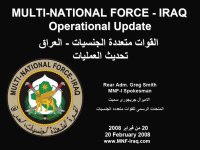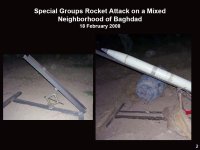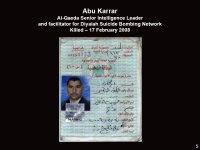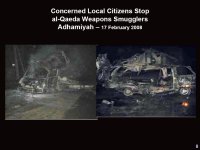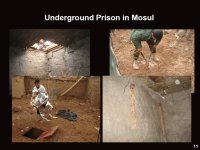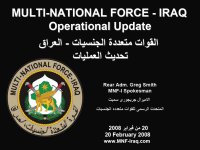
Operational Update: Rear Adm. Smith
Multi-National Force-Iraq
Rear Adm. Gregory Smith, director of MNF-I's Communication Division, provides an operational update, Feb. 20.
PRESS CONFERENCE:
Rear Admiral Gregory Smith, Director of Communications, Deputy Spokesman, Multi-National Force – Iraq
DATE: February 20, 2008
TRANSCRIBED BY: SOS INTERNATIONAL LTD.
PARTICIPANTS:
Rear Admiral Greg Smith
REPORTERS:
[unintelligible] from CBS News
Tina Susman from The Los Angeles Times
Brad Brooks from the Associated Press
Rich Yapel[ph] from The New York Times
Steve Lannen from McClatchy Newspapers
REPORTERS 1-13
*REP1 = REPORTER 1
*INT = INTERPRETER
RDML SMITH: Good afternoon. As-Salāmu `Alaykum. I’d like to begin today with a brief look at operations and security in Baghdad. As we discussed over the one-year mark…as we have crossed over the one-year mark since the inception of Operation Fardh al-Qanoon, security has improved for the people of Baghdad, but there is still much work to be done. In February last year, terrorists killed 1,087 men, women, and children in Baghdad. In January of this year, 178 innocent Baghdadis lost their lives to terrorism. Despite a decline of over 75%, the number of deaths is still too high and each victim is a tragedy. Today, 48,000 Iraqi Army and national police, 34,000 coalition forces, 31,000 Concerned Local Citizens, and 18,000 additional local police are working in the Baghdad area to improve on these security gains. There are 50 joint security stations, 22 combat outposts, and 109 Iraqi police stations with plans for even more joint security stations and combat outposts in the near future. While the progress has been significant, we all know Baghdad is not safe from al-Qaeda and other extremists. On Monday, Iranian-backed special group criminals launched an indiscriminate rocket attack in the city killing and injuring several innocent Iraqis. Firing from an open field located between Bayaa and Saydiyah areas of Baghdad, these criminals launched 16 rockets in the direction of Baghdad International Airport, West Rashid, and the Victory Base Complex. Apparently unconcerned where these rockets would land and explode, this blatant disregard for human life killed five innocent Iraqis and wounded 14, six of which were children. The attack also wounded two coalition force soldiers. The special group criminals didn’t discriminate as both Shi’a and Sunni were caught up in their violence. In a combined operation between Iraqi and coalition forces, the point of origin of these attacks was quickly determined and a quick reaction force responded immediately. Six men were detained at the scene, all of them testing positive for explosive residue on their bodies. Coalition force soldiers also seized 19 rail systems used to launch the rockets, and one 107 millimeter rocket ready to be fired, and a number of other high explosives and munitions. And last night in the New Baghdad area, special groups once again fired rockets wounding three coalition soldiers. After the initial attack, the quick reaction of the Iraqi police found an abandoned truck loaded with multiple rockets ready to be fired. Iraqi Explosive Ordnance Disposal attempted to render the rockets safe. And regrettably, one exploded killing five national police officers and wounding ten others. Their selfless bravery no doubt saved the lives of countless innocent Iraqis had the special groups been able to successfully fire these rockets from this truck. Also last night, special groups’ criminals fired a number of rockets in the Rustamiyah area that resulted in one U.S. civilian killed and injuries to both coalition and U.S. civilian personnel. And while unacceptable actions by special group criminals continue, we are seeing confidence in security creating space for reconciliation. In February, 2007, ethnosectarian violence accounted for nearly 800 deaths in Baghdad. This past month the number of ethnosectarian- related deaths dropped below 40, a decrease of 95% in the past 11 months. During the same time period in Baghdad, suicide attacks went from 12 a month to 4 this past January, a decline of 66%. And finally, the number of incidents involving improvised explosive devices has declined over 45% in Baghdad since the start of Fardh al-Qanoon. As Prime Minister Maliki and his military leadership have expressed in recent weeks and as I have pointed out earlier in my remarks, there is still much work to be done to secure Baghdad from extremism although progress is being made across the board. This past Sunday, a terrorist responsible for deadly attacks in Baghdad was killed by coalition forces. Abu Karrar was a senior intelligence leader in the al-Qaeda network based in Baqubah. He was also a terrorist facilitator for AQI’s suicide bombing networks in the Diyala River Valley, a network responsible for attacks here in Baghdad. He was also responsible for the murders carried out by female suicide bombers. Coalition forces were conducting an operation near Khan Bani Sad when they observed Karrar and another suspect fleeing in a vehicle and pointing weapons at the soldiers. Both terrorists were shot and killed. On Saturday, another al-Qaeda – Iraq senior leader was apprehended in the East Mansour neighborhood of Baghdad. Coalition forces captured Abu Sayf who was responsible for the two deadly car bomb attacks in Karrada on February the 11th. These attacks, if you recall, were conducted in a crowded square and killed 14 Iraqi civilians and one Iraqi Army soldier. Twenty-nine other Iraqis were wounded in the attack. And this past Monday, coalition forces captured a special groups’ leader operating out of the western Baghdad area. He oversaw the provision of weapons to special groups members including improvised…including explosively-formed projectiles and other munitions. He also ran a training network out of Baghdad selecting individuals who obviously were not honoring al-Sayyed Muqtada al-Sadr’s ceasefire by providing them with paramilitary training. Coalition soldiers and our Iraqi partners remain focused on protecting the people of Baghdad and the investigation into these three criminals and their extremist networks is continuing. Our investigation into al-Qaeda’s use of women as suicide bombers and our efforts to mitigate this threat also continues. On Sunday, the brave and quick actions of Iraqi Army soldiers prevented another attempt by a female suicide bomber to commit mass murder in the Rusafa market in Baghdad. Two soldiers on patrol in a crowded market noticed a woman acting erratically. They ordered her to stop and raise her hands. She lifted one arm and attempted to conceal an object attached to multiple wires with her other hand. The soldiers called out a warning and, without hesitation, fired three shots. The bomber staggered away from the center of the market towards a nearby store where the suicide bomb she was wearing exploded. Despite killing three and injuring several other shoppers, the vigilance and heroism of these three Iraqi Army soldiers prevented an untold number of deaths of innocent people in the market. But they are not the only Iraqis on the job against terrorism. On Sunday evening in Adhamiyah, alert members of a citizen volunteer group prevented al-Qaeda from smuggling homemade explosives and improvised explosive devices into their neighborhood. At a checkpoint, the Concerned Local Citizens were approached by a minivan traveling at a high rate of speed. When the minivan refused orders to stop, the citizen volunteers took defensive positions and opened fire. The driver attempted to escape while the vehicle exploded killing the two passengers inside. All three were killed. Coalition force explosive ordnance disposal experts who responded to the scene found evidence that the minivan had been packed with homemade explosives. This is yet another example where potentially deadly materials were prevented from being used to murder innocent Iraqis. Similar progress can be seen across Iraq as attacks have decreased in 17 of the 18 provinces. Much of this has been with the help of Iraqi citizens and security forces working together taking more weapons and more munitions out of the hands of terrorists. Last month, Iraq and coalition forces seized over 800 caches building on the record number of caches found and cleared in 2007. As I’ve shared with you, Operation Fardh al-Qanoon has led to substantive progress in and around Baghdad. But al-Qaeda and special group criminals still remain very active. And while statistics don’t tell the whole story, we know that Iraq’s future will be in the hands of a growing and more capable Iraqi security forces. This along with a dedicated force of volunteer citizens will lead to continued improvements and a brighter future for all Iraqis. And while security continues to steadily improve, we are seeing more signs that the international community is stepping up to pledge its support in assisting in rebuilding Iraq, both its social infrastructure as well as its economy. On Monday, the United Nations High Commissioner for refugees announced that their office is returning to Baghdad. This will help support Iraq’s goal of one day safely returning all Iraqi citizens back to their homes. We have also seen the goodwill by the government of Japan to help Iraq with key economic development projects which will help foster reconciliation among the people. Japan has long been a vital and trusted partner of the United States and we are very encouraged by their work and their…with the leadership here in Iraq. Finally, I’d like to mention that shortly after this press event is concluded, there will be another news conference in this room. The Ambassador from the United Kingdom, His Excellency Christopher Prentice, will be joined by Mr. Michael Waring of the Basra Development Commission. They will be discussing economic development in the Basra area. And with that, I’d be happy to take your questions. Yes, sir.
REP1: [unintelligible] CBS News. Two questions. One, you said that they were…the people who set off one of those sets of rockets were Iranian-backed radicals. Could you give us some indication of what you found when you caught them and when you got there that made you say that? And the other thing was how much effect do you think the Muqtada al-Sadr ceasefire has had on security in the Baghdad region? And if he doesn’t extend that ceasefire after Saturday when it expires, what the effect might be.
RDML SMITH: First of all, the type of munitions used in these events have all been signature Iranian type of weapons first of all. Secondly, of course, with the detention, we’ve had the opportunity to ask questions of the detainees and that has also led to some additional information as to what network they worked in. So we’re building on our knowledge of all those events but they appear to be all linked to special group activity which is Iranian backed. Regarding the ceasefire, we remain encouraged by comments made over the past month or two that Muqtada al-Sadr and the Sadr Trend completely supports rebuilding the new Iraq in a peaceful and democratic way and that the extension of a ceasefire would be a productive positive step in that direction. So we’ll deal with the contingencies of the what if when it occurs but as of today the ceasefire remains in place and we would hope and expect that it would continue. This side, please. Third row.
REP2: Thank you. Tina Susman; Los Angeles Times. Regarding the ceasefire, what are you doing…what is the military doing right now to basically reach out to Muqtada al-Sadr or the Sadrists and try to persuade them to extend the ceasefire? Because there’s…one of Sadr’s spokesmen today has been kind of quoted as saying that…well indicating that patience is running out. So what role is the U.S. military playing in trying to get them to extend the ceasefire?
RDML SMITH: I think the most…the clearest role we play is in support of the Government of Iraq’s efforts to work with all parties associated with bringing about peace in Iraq. And amongst those are, of course, the members of the Jaish al-Mahdi and the Sadr Trend. There is multiple opportunities to comment on the productive nature of these ceasefires that has occurred both publicly and privately. I think Sadr and…Muqtada al-Sadr and the members of the Sadr Trend, again, recognize the role they play in the Shi’a community as responsible members of that society. And the Shi’a themselves have voiced their concerns and interests in seeing violence being reduced. And looking towards an Iraq that involves more of a democratic and political process versus the use of guns and violence. So our connection with the Sadr Trend is one that involves not, well, not direct dialog with Muqtada al-Sadr himself, but certainly with members of his community. And multiple discussions and opportunities to express our opinions shared often. Yes, sir. Third row, please.
REP3: Brad Brooks with the Associated Press. I’m just curious if… considering how much Sadr’s group has splintered, how much will it really matter if the ceasefire is extended? I’m assuming that the groups that fired the missiles, these…or the rockets in the last attacks were possibly part of a splinter group. I mean how much of a worry is that for you guys?
RDML SMITH: There has been activity by those who have not honored the ceasefire since the ceasefire was called in August. So we’ve had, obviously, opportunities to assess the impact by seeing the, as we’re all witnessing, a decrease in the levels of violence and numbers of attacks overall. It’s also given the security force of both Iraqi and coalition an opportunity to go after al-Qaeda which has been the principal threat to Iraq’s security during that period of time. So the last few days of activity by special groups is of concern only in the sense that they obviously are sending a message that they do not support a peaceful transition in Iraq. That their way forward will involve violence. They fully intend to use indiscriminate attacks or rocket fire to carry out their agenda. And to the extent that that is allowed to spread and influence other extremist groups remains to be seen. But Muqtada al-Sadr and the Sadr Trend have been very…their steps have been very positive in reducing violence and we expect that to be the course of action in the future. Second row, please.
REP4: As-Salāmu `Alaykum. Asks question in Arabic.
INT: Question from al-Sala[ph] TV. Everybody knows that the Iraqi security forces is witnessing great development. Despite that, there are some…several security issues handled by the Multi-National Forces. When do you think the Iraqi forces will be ready to handle the security situation fully?
RDML SMITH: It’s hard to say precisely a date when the Iraqi security forces will have responsibility for all 18 provinces. But as you know, nine of those provinces are under the control of the Iraqi government and, therefore, the Iraqi security forces are the principal security element. And the coalition provides more of a strategic partnership in those nine provinces. The productivity of building a more capable Iraqi security force in 2007 by increasing the numbers by 125,000, police and Army, demonstrates the commitment by the Government of Iraq to build a force that is capable of doing, as you point out, full control of all of the security across the country. So I’d expect in 2008 we’ll see a continuing development of both numbers and capability and that the Iraqi security forces will continue to generate the abilities to be able to take over additional provinces in 2008. Anbar has been expressed in recent months as an area where that is occurring daily, where U.S. and coalition forces are no longer in the cities. They are largely out in the rural areas. The Iraqi police have taken over the major cities. Iraqi Army provide the corridor of security around those cities—Fallujah, Ramadi as examples. So you are seeing examples of that throughout Iraq. But to precisely predict the date and time certain when that final transfer of the last remaining province will take place is certainly too early to call at this point. First row.
REP5: Asks question in Arabic.
INT: These terrorists…recent terrorist attacks in the last month were actually much more than what happened a few months ago, especially in areas that actually now are stable like in Karrada. Do you think that these attacks that happened are being conducted by groups that are coming from outside the areas or actually within those areas itself? The second question is regarding the attack that targeted the terrorists in the provinces. Do you think that the reports of…or in Mosul, do you think the attack will go on for one year? And do you approve the analysis that says the Multi-National Forces and the Iraqi forces are…they can get cordoning the area so that they force the terrorist groups to flee the province or the city to reduce the casualties among the Iraqi security forces?
RDML SMITH: I would say to your first question, in general, very few areas in Iraq are experiencing violence by local, indigenous populations. They are largely outsiders—meaning folks that do not live in the local area, al-Qaeda among them, of course—that have come into neighborhoods and villages and have perpetuated the violence that we’ve seen. And so I suspect, in a general sense to answer your question, that the areas of violence we are currently experiencing are individuals who have moved into these areas with purposes that were obviously going to generate a great deal of intimidation, of violence, murder and kidnapping to take over those communities and to extend their reach and influence. And we have been, along with the Iraqi security forces, very active in working those particular areas inside of Iraq. So our work continues as I pointed out before. Relative to Mosul, I won’t necessarily address your question specifically but I do want to point out a couple of things that I think are of note that are worth pointing out today on Mosul. On Monday, coalition forces captured the military emir of Mosul. He was moved to al-Qaeda from the Bayji area to Mosul just in late January replacing the previous military emir whom we apprehended on January 21st. And there will be a slide here…coming up here in a moment. You’ll see here that on…also in the last couple of days Iraqi Army and coalition forces rescued a kidnapped Iraqi yesterday who was being held in an underground cell in eastern Mosul. Based on a tip, Iraqi Army soldiers went into a courtyard of a residence and noticed a disturbed section of the yard. The soldiers uncovered some loose soil and pulled back a leather cover laid over the locked steel hatch you see there. Once the locks were broken, an underground concrete bunker was revealed. Inside this 8’ wide, 8’ long, 4’ deep hole contained a very cold and frightened individual. There were chains attached to the wall, a blanket on the ground, and a few small food items. The man had been taken captive two days prior by a large group of masked men from his home. We assessed that al-Qaeda was attempting to intimidate this man’s family and perhaps collect ransom. Fortunately for this one individual, he was found alive by Iraqi security forces and has since returned home to take care of his family. Those are just a couple of examples of the work going on in Mosul. And I say that only because our efforts in Mosul had been…have not slowed down apace. In fact, they’ve been very aggressive. Our efforts to build up the confidence of the people of Mosul to begin working with security forces has been ongoing. And I suspect you’ll see more and more of the kind of tips that led to the release of this kidnap victim in the days to come.
REP6: Asks question in Arabic.
INT: The concrete barriers actually hinders the work of MNF-Baghdad in Iraq. And some of the American soldiers opened fire on the…some of the laborers who work in the streets. What’s your opinion about this? This is the first question. The Basmiyah[ph] Training Center that has 22 instructors, they still haven’t received their salaries for nine months. What’s your support and, again, your opinion about this?
RDML SMITH: I think your first question dealt with concrete barriers and whether or not they are effective in stopping violence. Well, I think that any study of the concrete barrier issue has proven that they have been very, very successful in limiting the amount of violence in a neighborhood and in market areas. It is clearly a temporary measure that long term will one day be reduced as violence levels come down. But the use of barriers to cordon off areas to protect from vehicles and other individuals—I’ll use as an example, last week when I showed you the…outside the Sadr market where a car parked full of explosives by [an] individual selling on the black market, in this case, special group members, it blew up next to one of those concrete barriers. Right on the other side was market stall after market stall [and] hundreds of people who were unaffected by that because that wall was there. I don’t…I can’t address your other allegation of U.S. soldiers opening up fire on workers. I’ve never heard of such a thing and I would challenge you that such a thing existed. And I would help you to come see me afterwards to tell me what details you have. As far as Basmiryah[ph], I’m not familiar with the paying of salaries. That’s something, obviously, that the minister of interior or the minister of Army would…minister of defense would have to deal with. But again, I would hope you would address those questions to the Government of Iraq officials. Sir.
REP7: Admiral Smith. Rich Yapel[ph] with The New York Times. Just on the issue of the insurgency using mentally retarded people for suicide bombers, there were some statements I guess by Iraqi officials a few weeks ago that the bombings at the beginning of the month were carried out by women with Down’s Syndrome or mental retardation. Have we been able to establish whether that was the case or whether any other bombers recently or at any point have been…had Down’s Syndrome or mental retardation?
RDML SMITH: Sure. Let me just review some of the statistics here so we’ve got a common understanding. In terms of female suicide bombers, there’s been 19 that we’re aware of and have tracked since 2003. Two of those occurred in 2003. Five in 2005. None in 2004. None in 2006. Six in 2007. And then six so far in 2008. We’ve seen an increase in the use of female bombers when you consider this being the total, 19. In the last four months, since November, 9 of those 19 events occurred in those few months. The specifics of whether or not the women were mentally challenged is, in terms of all 19, I don’t have specifics beyond what I can currently tell you which is that the two that were involved in the pet market bombings most certainly had a history of psychiatric treatment. That has been substantiated. We are completely informed by their case files. We know precisely who the women are. We know precisely their families and where they are from. And obviously, to protect the families, we are not going to announce that here at this podium. But we do have certain proof that these women had been treated extensively for psychiatric issues. As far as the most recent bombing in which the woman was acting erratically, I do not know at this point. I’m certain that the investigation will reveal, again, who she was and whether or not she had been treated for any psychiatric issues in the past. So those are the three that I think you are focused on mostly. The event that occurred earlier happened actually on February 10th out near Fallujah where a checkpoint, again, a very alert guard stopped a vehicle heading through a checkpoint. He noticed a male driver had a bulky [unintelligible] in his chest area. Asked him to step out of the car. He blew himself up. And then two women in the back seat, one of which blew herself up. So we are counting her as what would have been a suicide bomber had she been able to get to wherever her target was. Again, we don’t know her disposition either in terms of her medical status. But we’re looking into that. So as we get more information, we’ll share it with you. But that’s what we have right now. Go ahead, Rich.
REP7: Thanks. Just one follow up. Did you say we’d seen the case files of the two from the pet market? And what did…did those files indicate Down’s Syndrome or what were their…?
RDML SMITH: These were psychiatric case files versus more medically or genetic issues. In other words, we don’t have a full…we did not have their full medical records. But in terms of psychiatric treatment, the reason they were being seen for, did not reveal Down’s Syndrome in those particular files but they did reveal a great deal more about their psychiatric condition and what they’d been treated for.
REP7: [unintelligible] specifics about what…?
RDML SMITH: Again, to protect those individuals, we certainly aren’t going to discuss their case files from here.
REP7: Okay.
RDML SMITH: Sir.
REP8: Asks question in Arabic.
INT: Radio Sawa. Regarding the manager of the Rashad Mental Hospital, you said last week that he is held captive with the American forces. Is he involved in smuggling the female…mentally disabled women to be carried out as suicide bombers? And the second question regarding the prosecution of the former Hakim Al-Zamali, the minister of health, they said the American side witnessed the investigation with Al-Zamali. Is the American part or American’s side of this investigation? And there are some witnesses who said that visas were given to some people for testifying in Al-Zamali’s prosecution. Is that true?
RDML SMITH: I’ll have to ask you to repeat the last part of that but let me take the first one first. The hospital administrator of the al-Rashad Hospital is being questioned by the coalition. He is linked through information we have separately of his potential involvement with providing information to al-Qaeda. We do not know precisely the extent of that relationship with al-Qaeda and we’re certainly going to fully develop this particular issue until we understand it. In the meantime, we’ll continue to pursue that and other leads to understand how al-Qaeda, in the case of the two women at least, were able to conduct that particular operation. As far as the minister of health, the prosecution of the two individuals that are…the trial began yesterday and has been postponed, I believe, until early March. That has been a Government of Iraq rule of law led by the criminal courts here…process. Our role in all of that has been in areas of security. But the principal investigation has been by the Government of Iraq. And I’m sorry. There’s a last piece to your question.
REP8: Repeats question in Arabic.
INT: The lawyers for Al-Zamali said the Americans gave the witnesses of the district attorney…they gave them visas to the United States in case…in exchange for giving testimony against Al-Zamali himself.
RDML SMITH: I have not heard that. The question was the U.S. purportedly providing visas to potential witnesses against these two individuals. That’s the first I’ve heard of that. I will certainly look into it and get back to you. Any other questions? Yes, sir.
REP9: Hi. Carlos Haman[ph] with Agence France Presse. A couple of us were a bit delayed at the entrance. So could you go over what you talked about in the first couple of minutes about, I guess, the rockets?
RDML SMITH: Well, I’m not going to…I don’t want to repeat for everyone else the first. I can certainly meet with you afterwards. But we outlined a great deal of activity associated with the improved security. We also discussed a number of recent events that involved indirect fire by special groups, Iranian-backed special groups, against targets here in Baghdad. We discussed the indiscriminate nature of those attacks, both killing and injuring Sunni and Shi’a. It happened on multiple occasions as I pointed out. But there’s also been some successful interdiction of both special groups and al-Qaeda leadership; I highlighted those. And again, I’ll be happy to share that with you afterwards. Yes, sir.
REP10: Steve Lannen; McClatchy Newspapers. There’s a report that the issue and the strike with some of the Safwa[ph] members south of Baghdad has been resolved and they are back on the job. Can you just talk a bit about that and what was done to reach an agreement with them? And how does this play into the overall nature of security in the area?
RDML SMITH: Thanks for asking that question. You know this has been obviously an area that there’s been a great deal of interest in by the media in terms of Awakening Groups and their purported lack of support [clears throat]. Excuse me. Their lack of support for continuing their mission. And this is a great example where you’ve got individuals who had a grievance, had an issue they wanted to work out. They sat down across the table. Our leadership in that area met with them on multiple occasions and they really had a long dialog of a common discussion that really centered around why we are there and why they are there which is to really improve the security in that area. And that anything that occurred on that particular event, the result in loss of life of several coalition…or several Concerned Local Citizens, is regrettable from both sides. And so we had, I think, a very fruitful discussion that resulted in them, again, coming to an understanding that they’ve got a role to play and we support their role and we certainly appreciate the sacrifices they make. And so they have returned back to their jobs.
REP10: Has there been any more determination about what happened with the firing and the fire back and forth?
RDML SMITH: Not that I’ve been apprised of. I know it’s part of an investigation so I assume as soon as that gets cleared up and we can talk about it, I’ll be happy to provide the information from here. Anyone else, please? Okay.
REP11: Asks question in Arabic.
INT: Recently, the joint media center, according to the recommendations they demand on the channels and the…in your tours and covering some media that is outside Baghdad. Why do you rely on TV and broadcast and newspapers? Recently, the joint media center or probably the CPIC… I’m sorry. I can’t understand the question. I think she’s referring to CPIC.
RDML SMITH: I’m going to try to answer your question although I’m not getting a clear interpretation of it. Do you want to help with it…translation?
UNIDENTIFIED: She’s trying to say that we use a lot of TV crews on our media trips, not newspapers or magazines, in the CPIC.
RDML SMITH: Well, there’s…I mean if your question is which media get to go on trips that are hosted by the coalition to outside Baghdad, it is all based on a first come, first served basis. And there is no discrimination against print versus television. Absolutely. In fact, we understand the role of print media as much as we would radio or television. Yes, sir.
REP12: Asks question in Arabic.
INT: Kee[ph] Newspaper. What are the results of the investigation from the Azangili[ph] bombings in Mosul especially Prime Minister Maliki sent his envoy to Mosul? And the second question: Do you support the Awakening Groups in northeast Mosul?
RDML SMITH: I would steer you back to the prime minister’s office or the minister of defense regarding their findings of any conclusions resulting from that bombing that took place; actually it was more of an explosion. It wasn’t a bombing. Concerned Local Citizens, volunteer groups, I think have a role to play in Mosul. Again, no two places in Iraq are the same. There will be no…there’s no simple answer for how to approach this kind of an issue. But I think we’ll see that, again, citizens of Mosul want to participate in some form or another. And how that gets worked out on the ground, we’ll wait to see. But I believe there will be a role to play there. Yes, ma’am.
REP13: Back to the recent rocket attacks, to what do you attribute this sudden activity? I mean for months we’ve been kind of hearing about how these kinds of things have really ebbed and there was some indications that, you know, that Iran was I guess keeping a pledge, so to speak, that they’d made to the Iraqi government to tone down the activity. And suddenly we’re seeing some pretty spectacular incidents. What’s going on?
RDML SMITH: It really is unclear. We do not know precisely whether this has been a coordinated effort; whether you’ve got individual special group members and their leadership that are making these decisions. There does appear, obviously, to be an increase in the number. You’ve…there’s no doubt that when you’ve got two or three in the last few days that that would be…that would get your attention. But we just don’t know yet. And certainly we will try to understand that. It will certainly be something we’ll want to talk to, again, the Shi’a leadership about to do all they can to stop this kind of activity so that Muqtada al-Sadr’s efforts in the ceasefire have been productive as I pointed out before. And to the extent that Iran or others can influence the activities of special groups operations, it will certainly reach out and make that part of our discussion. But it’s uncertain why they are motivated at this point in time to do what they are doing. Well, thank you. We’ve got another press briefing here in about 30 minutes and [unintelligible]. I’m sorry. Apparently the follow on press briefing has been canceled this afternoon. So I apologize for those that came for that. If nothing else, we’ll see you on Sunday. Thank you so much.
|
NEWSLETTER
|
| Join the GlobalSecurity.org mailing list |
|
|
|


